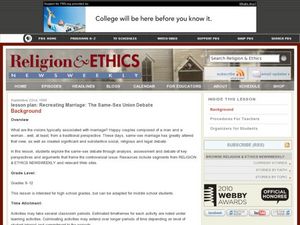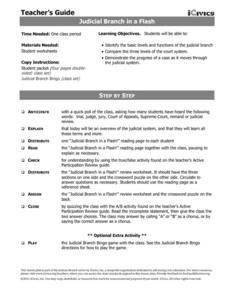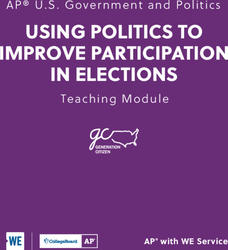Environment Agency - Abu Dhabi
Earthquakes
What causes earthquakes? What are the effects and impacts of earthquakes? How are earthquakes measured? If there was an earthquake on Mars, would it still be considered an earthquake? Class members will find the answers to these and many...
National Endowment for the Humanities
The President Under the Articles of Confederation
The Articles of Confederation sounds like one big, fancy title to middle schoolers. Here, scaffolded steps help to ease novices into understanding this all-important American document. Discussion questions, lesson activities, and ideas...
American Psychological Association
Memory
How does memory work, and how can we recall more? Here is a five-lesson unit that covers the multi-system model of memory, as well as sensory, working, and long-term memory.
Curated OER
Recreating Marriage: The Same-Sex Union Debate
A debate continues regarding same-sex marriage as a constitutional right. This lesson requires learners to define marriage then formulate an argument that reconstructs the national debate perspectives. Many standards are addressed but a...
iCivics
Drafting Board: Interest Groups
Does the influence of interest groups harm a political system? Your class members will analyze the role of interest groups in American politics, as well as consider the effect of perspective, bias, loyalty, and the First Amendment.
iCivics
Drafting Board: Military Intervention
Should countries use their militaries to stop humanitarian crises in other countries? Learners make claims, organize their reasoning, and provide evidence for their arguments with this rich resource.
iCivics
Drafting Board: Electoral College
Should the president of the United States be voted by the Electoral College or the popular vote? Your young historians will consider the pros and cons of the Electoral College, and make an argument using reasons and evidence provided in...
iCivics
Drafting Board: Community Service
Should schools impose community service graduation requirements? In the final lesson of the Drafting Board series, learners solidify their practice of crafting an argument supported by sound reason and evidence.
California Polytechnic State University
Australian Geography Unit
At the heart of this resource is a beautifully detailed PowerPoint presentation (provided in PDF form) on the overall physical geography of Australia, basic facts about the country, Aboriginal history, and Australia culture and lifestyle.
Alabama Department of Archives and History
W.E.B. DuBois, Booker T. Washington, and Jim Crow
Class members use the think-pair-share strategy to compare the views of W.E.B. Du Bois and Booker T. Washington and to consider how each man's backgrounds influenced his philosophy.
City University of New York
The Split Over Suffrage
Compare and contrast Frederick Douglass's and the National Women's Suffrage Association's stances on equal rights and suffrage with a series of documents and worksheets. Learners work together or independently to complete the packet, and...
Curated OER
The Happy Progress of Our Affairs: George Washington and the U.S. Constitution
High schoolers engage in a lesson which uses Washington's own words to illustrate the events leading to the establishment of our national government, and the crucial roles he played throughout that process.
Jamestown-Yorktown Foundation
Why Did Some Colonial Virginians Seek Independence?
To understand the reasonings of those colonials who sought independence from England, young historians are divided into content groups that examine documents related to either the Boston Tea Party, the Yorktown Tea Party, Tea Overboard,...
iCivics
Judicial Branch in a Flash
What is the difference between the federal court and state court systems? What about criminal versus civil cases? Check out this resource that will offer your class members a general and effective overview of the judicial branch in the...
Civil War Trust
The Gathering Storm: The Coming of the Civil War
Take a longer look at a formative time in history with a lesson that explores the causes of the American Civil War. After viewing a series of images and explanations for various forces at play, middle schoolers choose the images that...
Theodore Roosevelt Association
Roosevelt's Legacy: Conservation
The legacy of Theodore Roosevelt carries through modern American politics, economics, foreign policy, and society. But his proudest and most profound efforts were in the world of conservation, and in preserving the natural beauty of...
College Board
Using Politics to Improve Participation in Elections
Instructors new to teaching AP U.S. Government and Politics classes, as well as seasoned veterans, will find this teaching guide an invaluable resource. Using a project-based approach to civics education, the lessons emphasize real-world...
US Department of Labor
Teamwork
Here's a series of five exercises designed to help teens develop the team work skills needed in the 21st century classroom and workplace.
National Endowment for the Humanities
How to Win a World War
High schoolers are have begun to learn the art of diplomacy with each other, but do they understand how diplomacy works at a global level? The second in a series of four lessons, guides scholars in evaluating primary sources. The why...
Essential Kids
Australian Animal Memory Game
Kangaroos, platypuses, koalas...oh my! Your youngsters will love this printable memory game featuring eight different adorable Australian animals.
Library of Congress
Industrial Revolution
Could you live without your phone? What about cars, steel, or clothing? Class groups collaborate to produce presentations that argue that either the telephone, the gramophone, the automobile, the textile industry, or the steel industry...
Syracuse University
American Industrial Revolution
While the Industrial Revolution may have fueled America's rise to the top of world markets, the child laborers often faced dangerous conditions. Using primary source images and other information, scholars consider what these children...
National Woman's History Museum
Congresswoman Jeannette Rankin
Political activist, suffragette, pacifist, and the first woman elected to Congress, Jeannette Rankin has been largely ignored in history and history textbooks. Young historians set out to rectify that situation by examining primary...
Curated OER
A New Society Project
Ninth graders examine the social and political movements of the Gilded Age and Progressive Era. In this American history lesson, 9th graders work in groups to form their own society and laws. Students make a diagram of their town and...

























